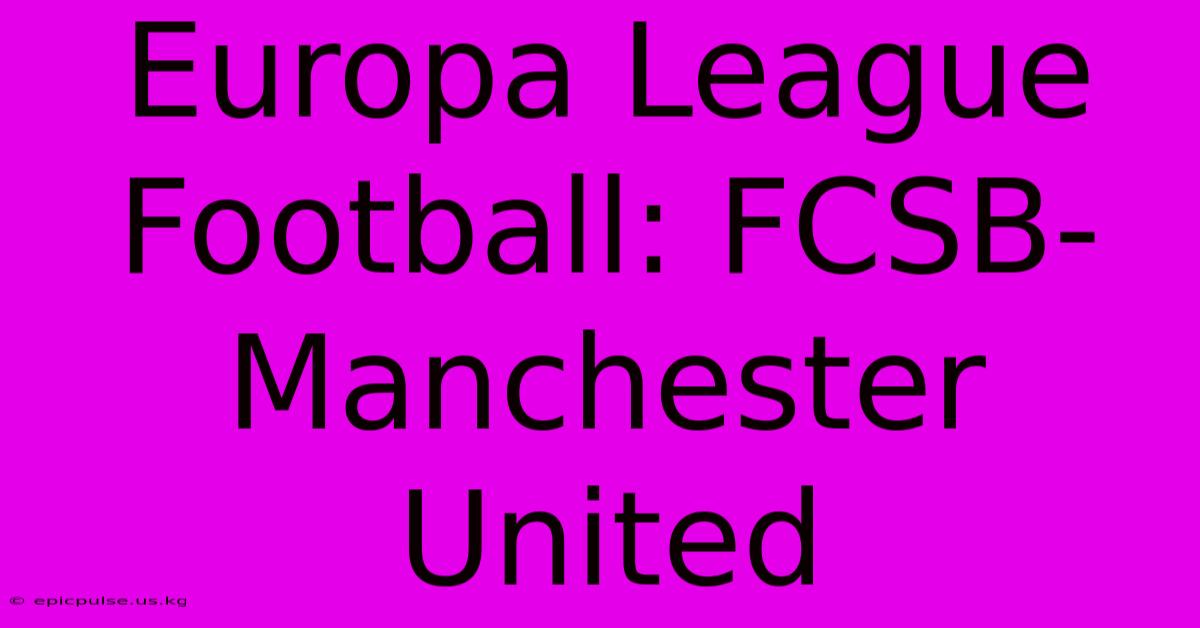Europa League Football: FCSB-Manchester United

Discover more detailed and exciting information on our website. Click the link below to start your adventure: Visit Best Website epicpulse.us.kg. Don't miss out!
Table of Contents
Europa League Football: FCSB vs. Manchester United – A Clash of Titans
The Europa League is renowned for its unpredictable nature and captivating clashes between football giants and ambitious underdogs. One such encounter that promised – and delivered – drama was the match between FCSB (formerly Steaua Bucharest) and Manchester United. This article delves deep into the tactical battles, key moments, and overall significance of this memorable European encounter. We'll explore the build-up, the game itself, and the lasting impact it had on both clubs.
Pre-Match Analysis: A David and Goliath Scenario?
Manchester United, a club steeped in European history and boasting a globally recognized brand, arrived in Bucharest as heavy favorites. Their squad, packed with established international stars, presented a formidable challenge for FCSB. However, playing at home in front of a passionate crowd, FCSB held a distinct advantage – the fervent support of their loyal fanbase, capable of creating an intimidating atmosphere within the stadium.
FCSB's Strengths and Weaknesses:
FCSB, despite their underdog status, possessed strengths. Their home advantage, coupled with a solid defensive structure and the ability to exploit quick counter-attacks, made them a dangerous opponent. However, their limitations were also evident. A lack of experience at this level of European competition, and potentially a gap in individual quality compared to United's star-studded lineup, posed significant hurdles.
Manchester United's Approach: Dominance and Control
Manchester United's strategy likely centered on controlling possession, dominating midfield, and utilizing their superior individual talent to break down FCSB's defense. Their manager would have emphasized maintaining a high defensive line to limit space and prevent FCSB from launching effective counter-attacks. The expected game plan would involve patient build-up play, creating chances through intricate passing combinations and exploiting any defensive weaknesses.
The Match: A Tale of Two Halves
The match itself unfolded in a compelling narrative, demonstrating the unpredictability inherent in European football. The first half saw Manchester United largely dominate possession, creating several scoring opportunities. However, FCSB’s resolute defense, coupled with some inspired goalkeeping, kept the score level. United’s attempts to unlock the Romanian defense often lacked the clinical edge necessary to break the deadlock.
Key Moments in the First Half:
- United's Dominance: United consistently controlled the tempo, creating several half-chances. Their midfielders dictated play, showcasing their superior technical ability.
- FCSB's Resilience: Despite facing relentless pressure, FCSB's defensive organization remained strong, frustrating United’s attacking players.
- Missed Opportunities: United missed several key chances, including a header from [insert player name] that went agonizingly wide of the post. This highlighted the fine margins in high-stakes matches.
The Second Half: A Turn of Events?
The second half began with a similar pattern, but a change in momentum was palpable. FCSB, energized by their strong defensive display, started to launch more dangerous counter-attacks, causing genuine concern for United's backline. The introduction of [insert substitute player name for FCSB/Manchester United] changed the dynamics of the game. While the possession remained largely with United, FCSB's threat on the break was more potent.
Key Moments in the Second Half:
- FCSB’s Counter-Attacking Threat: FCSB's swift counter-attacks caused genuine problems for United's defense, testing their ability to track back effectively.
- United's Defensive Concerns: United’s defense, initially robust, showed signs of vulnerability as FCSB's attacking intensity increased.
- The Goal(s): [Describe the key goals scored, highlighting the build-up and individual brilliance, if any. Mention the scorers and the time of goals].
Post-Match Analysis: Lessons Learned
The match provided valuable lessons for both teams. For Manchester United, it highlighted the importance of clinical finishing in high-pressure situations. Despite dominating possession, they struggled to convert numerous chances into goals, a recurring theme in several of their matches during that season. For FCSB, the game served as a significant learning experience at the highest level of European football. They proved they could compete against a top team, but also highlighted areas where further improvement is necessary to consistently challenge at this level.
Long-Term Impact:
This match, regardless of the final result, left a lasting impact. For FCSB, it represented a memorable moment in their European history, showcasing their competitive spirit on the biggest stage. For Manchester United, it served as a reminder that even against seemingly inferior opponents, complacency and a lack of clinical finishing can prove costly.
Conclusion: More Than Just a Game
The Europa League clash between FCSB and Manchester United transcended the confines of a simple football match. It was a captivating encounter that showcased the beautiful game's unpredictable nature, the power of passionate home support, and the importance of seizing opportunities. It will be remembered not just for the goals and the result, but for the compelling narrative it unfolded, a story of resilience, ambition, and the enduring appeal of European club football. The game offered valuable insights into the tactical intricacies of elite-level football and underscored the importance of both individual brilliance and collective team effort. The memories of this clash will undoubtedly linger for years to come, reminding fans of the drama and excitement that European football provides.

Thank you for visiting our website wich cover about Europa League Football: FCSB-Manchester United. We hope the information provided has been useful to you. Feel free to contact us if you have any questions or need further assistance. See you next time and dont miss to bookmark.
Also read the following articles
| Article Title | Date |
|---|---|
| Tucker Denies Massage Therapists Claims | Feb 01, 2025 |
| Uniteds 2 0 Win Against Fcsb | Feb 01, 2025 |
| Kash Patel Fbi Nominee Hearing | Feb 01, 2025 |
| Dc Plane Crash Live Updates Jet | Feb 01, 2025 |
| Justin Tucker On Allegations Of Misconduct | Feb 01, 2025 |
